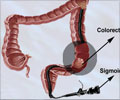A new report has found that an estimated half a million cancers were prevented by screening of colorectal cancer

The Yale COPPER team studied the colorectal cancer incidence data from the National Cancer Institute's Surveillance, Epidemiology, and End Results database, along with its Cancer Trends Progress Report. Researchers found that the incidence of late-stage cancer decreased from 118 cases per 100,000 people over the age of 50, to 74 cases per 100,000. They also found that the incidence of early-stage cancers declined from 77 to 67 cases per 100,000 people over the age of 50, during a period where cancer screening increased from 34.8% to 66.1%. After adjusting for trends in cancer incidence, the authors calculated that there was a reduction of 550,000 cancers during this period of increasing screening.
"These numbers represent real patients and families who have been spared the trauma of a cancer diagnosis and treatment," said the study's senior author, James Yu, M.D., assistant professor of therapeutic radiology at Yale School of Medicine. "Colorectal cancer screening is one of the major successes in cancer care."
These findings are particularly significant in light of recent controversy surrounding mammography screening for breast cancer, and suggestions that it may result in false positive diagnoses and overtreatment, note the researchers. "The efficacy of colorectal cancer screening is important to highlight, especially at a time when there has been a national discussion about screening for other types of cancer," said Cary Gross, M.D., a co-author on the study and director of the Yale COPPER Center.
Source-Eurekalert
 MEDINDIA
MEDINDIA



 Email
Email




